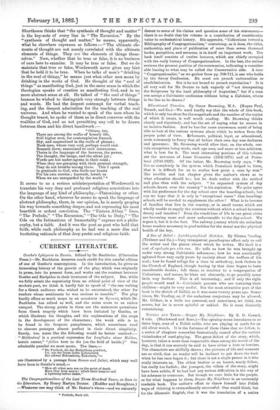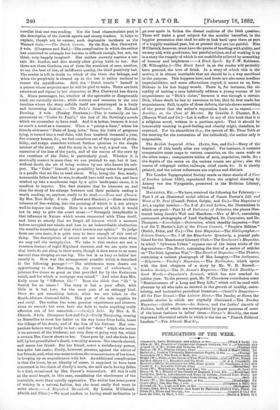NOVELS AND TALES.—Beggar My Neighbour. By E. D. Gerard. 3
vols. (Blackwood and Sons.)—The opening scene introduces to us three boys, sons of a Polish noble, who are playing at cards for an old silver watch. It is the fortunes of these three that we follow, in a series of chapters somewhat fantastically named after the various vicissitudes of card-playing. The great defect of the story, which, however, takes a more than respectable class among the novels of the day, is that it can scarcely be said to have either a hero or heroine. The characters are skilfully drawn ; the pictures of life and manners are so vivid, that no reader will be inclined to put down the book when he has once begun it; but there is not a single person in it who really interests us. The eldest brother is an honest, manly fellow, but really too foolish ; the youngest, the villain of the story, might have been subtle, if he had had any serious difficulties in the way of his schemes to overcome. But though we care little for the people, or for what happens to them, Beggar My Neighbour is an eminently readable book. The author's effort to throw himself into Polish ways of thinking is extraordinarily successfal. One would think, but for the idiomatic English, that it was the translation of a native novelist that one was reading. Not the least characteristic part is the description of the Jewish agents and money-lenders. It helps to explain, though not to excuse, such deplorable incidents as the Warsaw riots.—The Dutch Cousin. By the Hon. Mrs. Chetwynd. 3 vols. (Chapman and Hall.)—The complication in which the author has contrived to entangle her heroine is difficult enough, but not, we think, very happily imagined. Her mother secretly marries a cer- tain Mr. Gordon, and dies shortly after giving birth to her. But there are three Gordons, one of them the worthiest of men, another, to say the best of him, of indifferent quality, the third positively bad. The reader is left in doubt to which of the three she belongs, and when the perplexity is cleared up at the last is rather inclined to resent the mystification. Still, the "Dutch cousin" herself is a person whose acquaintance be will be glad to make. There are both sweetness and vigour in her character, as Mrs. Chetwynd has drawn it. Minor personages, too, whether of the agreeable or disagreeable kind, are naturally drawn ; while scenery and manners in the two localties where the story unfolds itself are pourtrayed in a lively and interesting fashion.—The Duke's Sweetheart. By Richard Dowling. 3 vols. (Tinsley Brothers.)—This is certainly an im- provement on "Under St. Paul's," the last of Mr. Dowling's novels which we remember to have read. And it is better,- because it is not so much a novel as a romance. When a " penny-a-liner," whom his friends nickname "Duke of Long Acre," from his habit of gorgeous lying, is turned into a real duke, with four hundred thousand a year, five country houses, &c., we feel ourselves out of the region of proba- bility, and resign ourselves without further question to the :simple interest of the story. And the story is, in its way, a good one. The narrative of the loss of the yacht, and of the rescue of the crew by the exertions of the Duke, is particularly good. Whether it is nautically correct is more than we can pretend to say, but it has, without doubt, the air of being written by one who knows his sub- ject. The "Duke" himself, his possibility being taken for granted, is a persBn that we like to read about. Why, being the fine, manly, honourable fellow that he was, he should have told such lies, and been worked up into a murderous rage by a quite inadequate cause, it is needless to inquire. The fact remains that he interests us, and that the story of his strange fortunes and their pathetic ending is worth reading, or, anyhow, easily to be read.—Time and Chance. By Mrs. Tom Kelly. 3 vols. (Hurst and Blackett.)—Here are three volumes of fine-writing, into the meaning of which it is not always well to inquire too closely. Here is a sentence of which it would not be easy to give the exact sense :—" Strangely inexplicable is that influence in Nature which seems connected with Time itself, and lures so utterly that we forget all interest which a moment before occupied our minds, and loge in an indescribable abstraction the sensible knowledge of that which invokes our spirits." To judge from our own taste, it is quite easy to have enough of this sort of thing. The descriptions of nature are not mach better than what we may call the metaphysics. We take it that rushes are not a common feature of rapid Highland streams, and we are quite sure that birds do not sleep in their nests, though it does seem to us more natural than sleeping on one leg. The law is as hazy as ladies' law usually is. How was the arrangement possible which is described in the following passage ?—" The settlements were drawn out apportioning to the Marchese, in the event of widowhood, a jointure five times as great as that provided for by the Kerinvean entail, and for which a mortgage was raised." And what does Mrs. Kelly mean by "different ilks ?" Does she think that " ilk " is Scotch for an estate ? The story is but a poor affair, with little in it but love, for the most part of an unhappy kind. Once we get something better, when we are taken to the South-African diamond-fields. This part of the tale supplies its real motif. The author has some genuine experiences and observa- tions to record; but even here she fails to make anything really effective out of her materials.—Cesily's Debt. By Mrs. A. B. Church. 3 vols. (Sampson Low and Co.)—Cecily Mannering, coming to Marseilles to meet her father on his way home from India, hears the tidings of his death, and of the loss of his fortune. Her com- panions behave very badly to her ; and the " debt " which she incurs is on account of the kindness, not very deep or going very far, which a certain Mrs. Carew shows to her. Years pass by, and she finds her- self, by her grandfather's death, a wealthy woman. She travels abroad, and meets her friend. But her friend, never a satisfactory person, has quite lost caste ; Cecily, however, persists, against the advice of her friends, and, what was more serious, the remonstrances of her lover, in keeping up en acquaintance with her. An additional complication is that the lover, by an identity of name, is supposed to have been concerned in the death of Cecily's uncle, the said uncle having fallen in a duel, occasioned by Mrs. Carew's misconduct. All this is told at the usual length, in this case, considering the slenderness of the materials, more than usually oppressive. The writer has some power of writing in a natnral fashion, but she must really find more to write aboat.—A Boycottsd Household. By Letitia 11`Clintock. (Smith and Elder.)—We must confess to having small inclination to
go over again in fiction the dismal realities of the Irish question. These will make a good subject for the novelist hereafter, in the happier generation that shall be able to look back upon them as part of a happily-vanished past, but at present they are too painful. Miss M'Clintock, however, must have the praise of handling with ability, and we may add, with good-taste, her painful subject, and of working it up
in a story the tragedy of which is not unskilfully relieved by something of humour and brightnesa—A Black Speck. By F.W. Robinson.
(R. Willoughby.)—The Black Speck is, as the reader will probably
have guessed, the love of drink. In a story of which this is the motive, it is almost inevitable that art should be in a way sacrificed to the purpose. This happens here, and there are also some needless improbabilities, and some affectations copied, it seems to us, from Dickens in his less happy moods. There is, for instance, the ab- surdity of making a man habitually address a young woman of his acquaintance as "Dick's sister," because it was through a certain Dick, whose death he has to announce to her, that he first made her acquaintance. Still, in spite of these defects, the tale shows something
of the power that the writer's reputation leads us to expect.— Aurelia ; or, the Close of Miveter. By Greville J. Chester, B.A.
(Marcus Ward and Co.)—Let it suffice to say of this book that it is
a religious novel, written in a partisan spirit. That it should be lamentably wanting in good-feeling and charity might, therefore, be expected. For its absurdities (e.g., the speech of Mr. Titus Tebb at the meeting for the restoration of the cathedral), the author only is responsible.



































 Previous page
Previous page